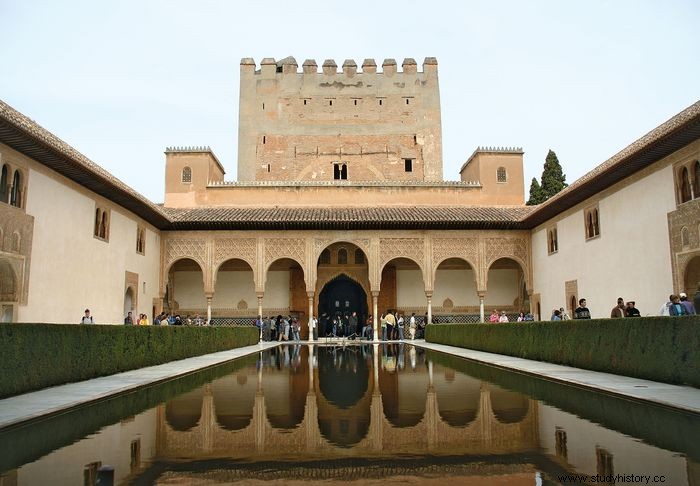Granada , Arabic Gharnāṭa , kingdom that emerged in the early 13th century from the remnants of Almoravid power in Spain was founded by Abu ʿAbd Allah ibn Yūsuf ibn Naṣr al-Aḥmar, the king was named Muḥammad I. (r. 1232–73) and founded the Naṣrid dynasty . The Kingdom included mainly the area of the modern provinces of Granada, Málaga and Almería. 1246 Muḥammad I secured the recognition of Ferdinand III. From Castile (its neighbor on all land borders) in return for a vassalage which, though often ignored, was until remained in force until the kingdom's disappearance in 1492.

 Read more about this topic Spain:Conquest of Granada The impact of the Muslims on Spanish life and traditions was different from that of the Jews. Perhaps the most obvious thing was...
Read more about this topic Spain:Conquest of Granada The impact of the Muslims on Spanish life and traditions was different from that of the Jews. Perhaps the most obvious thing was... Granada's history is one of internal crises stemming from the existence of a powerful landed gentry that the monarchy had to contend with from the start , and due to wars with Castile. Successive kings of Granada sought political support and military aid from Morocco . Moroccan recruits caused the kingdom to undergo an intense process of Arabization, cutting itself off from all Castilian influences and developing an absolute form of government based on military support. The central government's economic resources depended mainly on the silk industry and foreign trade. The latter flourished due to the fortunate location of the main port of Málaga on the way from the Mediterranean to the Atlantic. Granada paid close attention to Strait of Gibraltar ; For a full century, rulers struggled to gain control of the straits, allied at different times with Morocco and Castile. In 1306 Muḥammad III. (r. 1302–09), then in possession of Ceuta and Gibraltar, appeared to have been successful, but a powerful coalition soon reduced him to the humble position of vassal to the King of Castile. After 1340, as the The Battle of Río Salado settled the issue of the Straits in Castile's favour. Granada pursued a policy of isolation and took advantage of any favorable circumstances to strengthen its land borders. It was during this period that Yūsuf I (r. 1333–54) and finished Muḥammad V (r. 1354–59 and 1362–91) the construction of the Alhambra.
The civil war in Castile in the second half of the 14th century enabled Muḥammad V and Muḥammad VII (r. 1392– 1408), to develop a counter-offensive against Algeciras and the cities on the Guadalquivir, but from 1407 Castile took up the idea of conquering the kingdom of Granada as the last leg of the reconquest. The campaign was a large and costly undertaking, undertaken intermittently throughout the 15th century. Granada meanwhile disintegrated as a result of internal fighting. The Catholic Monarchs exploited this disagreement; The last king of Granada, Boabdil or Muḥammad XII, who reigned from 1482 to 1492, gave up his last stronghold, the city, on January 2, 1492 Granada, up.
